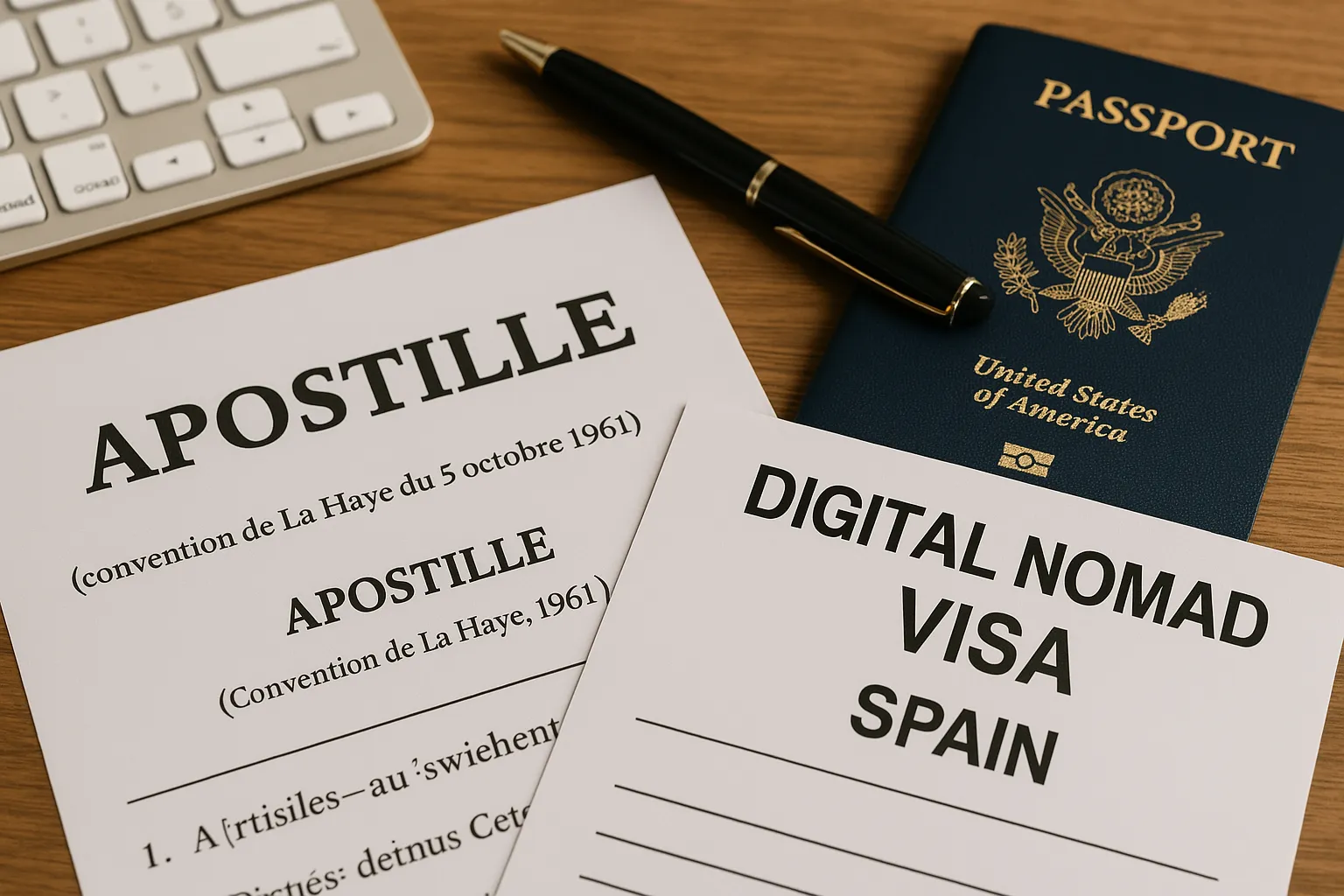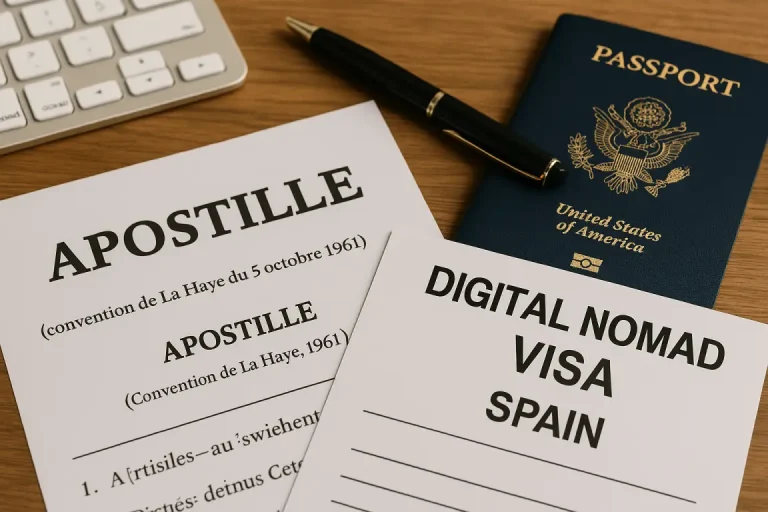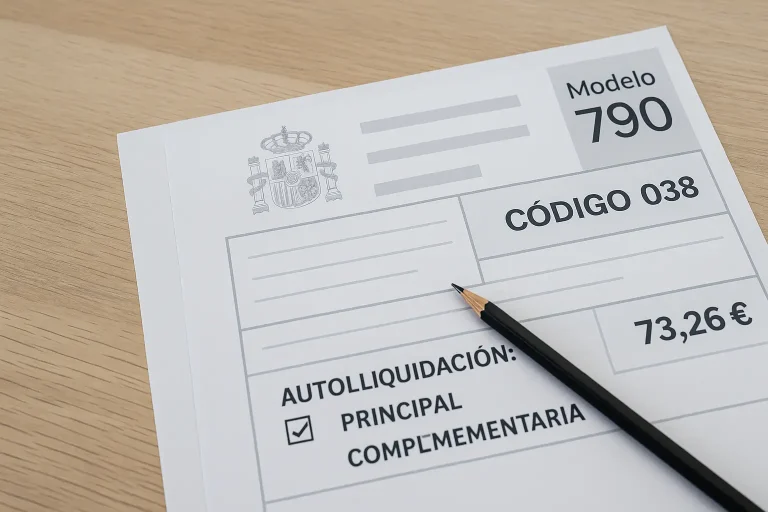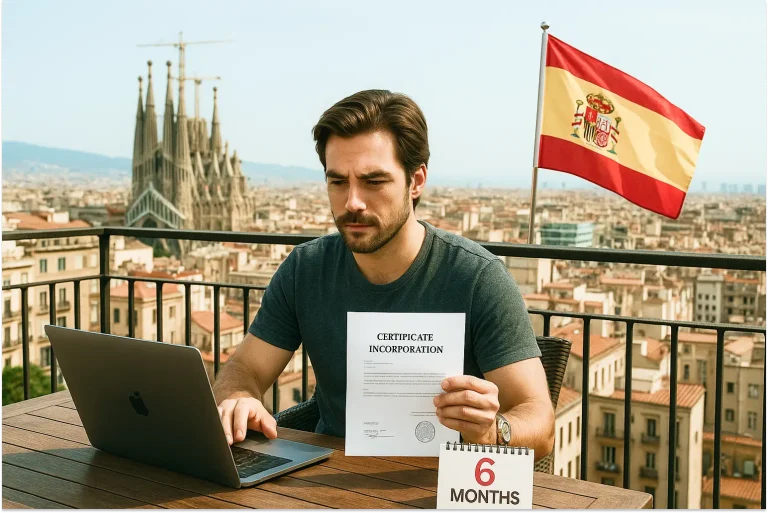
What Is an Apostille, and Why You Need One for the Spanish Digital Nomad Visa
If you’re applying for Spain’s Digital Nomad Visa, you’ll likely come across the term apostille. This seemingly bureaucratic word plays a key role in international document verification and getting it right is essential for a smooth visa process.
- Start early. The processes can take weeks, especially for FBI checks.
- Send scanned copies if applying for Spanish Residency.No need to provide hard copies of the documents and you may use scanned copies instead.
- Use tracked delivery if mailing documents.
- Confirm translation requirements with your nearest Spanish consulate or lawyer.
- Double-check validity. Make sure the seal and signature match Hague format.
In this guide, we’ll break down:
🧾 What Is an Apostille?
An apostille is a form of international document authentication created by the Hague Convention of 1961, which simplified the legalization of public documents to be used across borders. Essentially, it certifies the authenticity of a document’s signature, seal, or stamp so that it’s recognized in another country.
Spain is a member of the Hague Convention, so it accepts apostilled documents from other member countries without further legalization.
Example: If you’re submitting a U.S. background check to Spanish immigration, you’ll need it apostilled by the U.S. Department of State or the relevant Secretary of State.
🇪🇸 Apostilles and the Spanish Digital Nomad Visa
Spain’s Digital Nomad Visa (also known as the visado para teletrabajadores internacionales) requires applicants to submit various documents that come from outside Spain. To be valid in Spain, these foreign documents must be apostilled.
Common documents that need an apostille:
- Criminal background check from your country of residence (mandatory)
- Marriage certificate, if applying with a spouse
- Birth certificates of children (for family reunification)
- University degree or proof of professional qualification (sometimes required)
- Company documents (if you own a business and plan to invoice through it)
Without an apostille, these documents will not be accepted by Spanish authorities, even if they’re official in your home country.
📍 Where to Get it?
The process depends on your country of origin. Here are examples for a few common countries:
Apostille for United States
FBI Background Check
- Get your FBI Background Check
Apply online through the FBI’s official Electronic Departmental Order portal: - Send it to the U.S. Department of State for Apostille
After receiving the FBI report (PDF or hard copy), submit it to the U.S. Department of State, Office of Authentications
U.S. State-Issued Documents
For documents like birth or marriage certificates, the Secretary of State in the state where the document was issued handles the apostille.
Be sure to use certified copies of state documents when requesting an apostille
Example: How to Get an Apostille for a California Birth Certificate
Step 1: Obtain a Certified Copy of the Birth Certificate
You need an official certified copy issued by the California Department of Public Health or the County Recorder’s Office where the birth occurred.
CDPH Vital Records – Birth Certificates
Alternatively, you can order from the appropriate County Recorder’s Office (e.g., LA County Registrar)
Step 2: Verify the Document Is Properly Signed for Apostille
The California Secretary of State will only issue an apostille if the official who signed the certificate is on file with them.
Usually:
- County-issued certificates signed by the County Clerk or Registrar
- State-issued certificates signed by State Registrar Karen Smith or another authorized official
California SOS – List of Authorized Public Official Signatures
Step 3: Prepare and Submit Your Apostille Request
Required Materials:
- The certified birth certificate
- A completed Apostille Request Cover Sheet
- A check or money order for $20 (per document)
- A self-addressed stamped envelope for return mailing
Apostille Request Cover Sheet (PDF)
Step 4: Send Documents to the California Secretary of State
You can submit by mail or in person (Sacramento or LA offices):
Mailing Address:
Notary Public Section – Apostille
California Secretary of State
1500 11th Street, 2nd Floor
Sacramento, CA 95814
Official Instructions & Info Page
Apostille for United Kingdom
UK apostilles are issued by the Legalisation Office of the Foreign, Commonwealth & Development Office (FCDO).
Step-by-step guide to legalising a UK document can be found at the official UK Government – Get a document legalised website.
Apostille for Canada
- Canada is not a member of the Hague Convention, so apostilles are not available. You must instead go through legalization and consular verification (more time-consuming).
Step-by-Step: Legalizing Canadian Documents for Spain
1. Authentication by Global Affairs Canada (GAC)
First, you need to authenticate your Canadian public document (e.g., RCMP check, birth certificate) with Global Affairs Canada Authentication Services
You can also mail documents or use a courier processing takes 20+ business days by mail, faster if submitted in person by a courier or legalization service.
Address:
Global Affairs Canada – JLAC
125 Sussex Drive
Ottawa, ON K1A 0G2
Canada
You must submit:
- A return envelope with prepaid postage
- A completed Request Form
- The original document(s)
Submission instructions for Global Affairs Canada (how to prepare your documents)
2. Legalization at the Spanish Consulate in Canada
After authentication, you must submit the document to the Spanish consulate that has jurisdiction over your province (based on where you) for legalization. Each Spanish consulate in Canada has its own process, forms, and fees.
| Consulate | Covers | Link |
|---|
| Toronto | Ontario (except Ottawa), Manitoba | Consulate General of Spain in Toronto |
| Montreal | Quebec, Newfoundland & Labrador, Nova Scotia, PEI, New Brunswick | Consulate General of Spain in Montreal |
| Ottawa | Ottawa and national government-related matters | Embassy of Spain in Ottawa |
| Vancouver | British Columbia, Alberta, Saskatchewan, Yukon, NWT | Consulate General of Spain in Vancouver |
3. Certified Translation into Spanish
Once legalized, have the document translated into Spanish by a certified traductor jurado (official sworn translator).
This can usually be done in via email by a translator accredited by the Spanish Ministry of Foreign Affairs.
Important: Apostilles must be issued before you get documents translated into Spanish by a certified translator (traductor jurado).
Sworn Translator Search Tool (MAEC)
Scroll to “Buscador de Traductores-Intérpretes Jurados“
Translations can be done in Spain or abroad, but must be from an official translator accepted by Spanish authorities.
📌 Step-by-Step Summary for Apostilling Documents for Spain
- Request the original document (e.g., FBI report, marriage certificate).
- Get the document apostilled by the appropriate authority in your home country.
- Translate the apostilled document into Spanish using a certified traductor jurado.
- Include the apostilled and translated documents in your Digital Nomad Visa application.
Official Guidance
- U.S. Department of State Apostille Instructions
- UK Legalisation Office
- List of Hague Convention Member Countries
Need help applying for Spain’s Digital Nomad Visa? Nomadoro.com helps remote workers navigate Spanish bureaucracy with expert support. 🧑💻🌍


